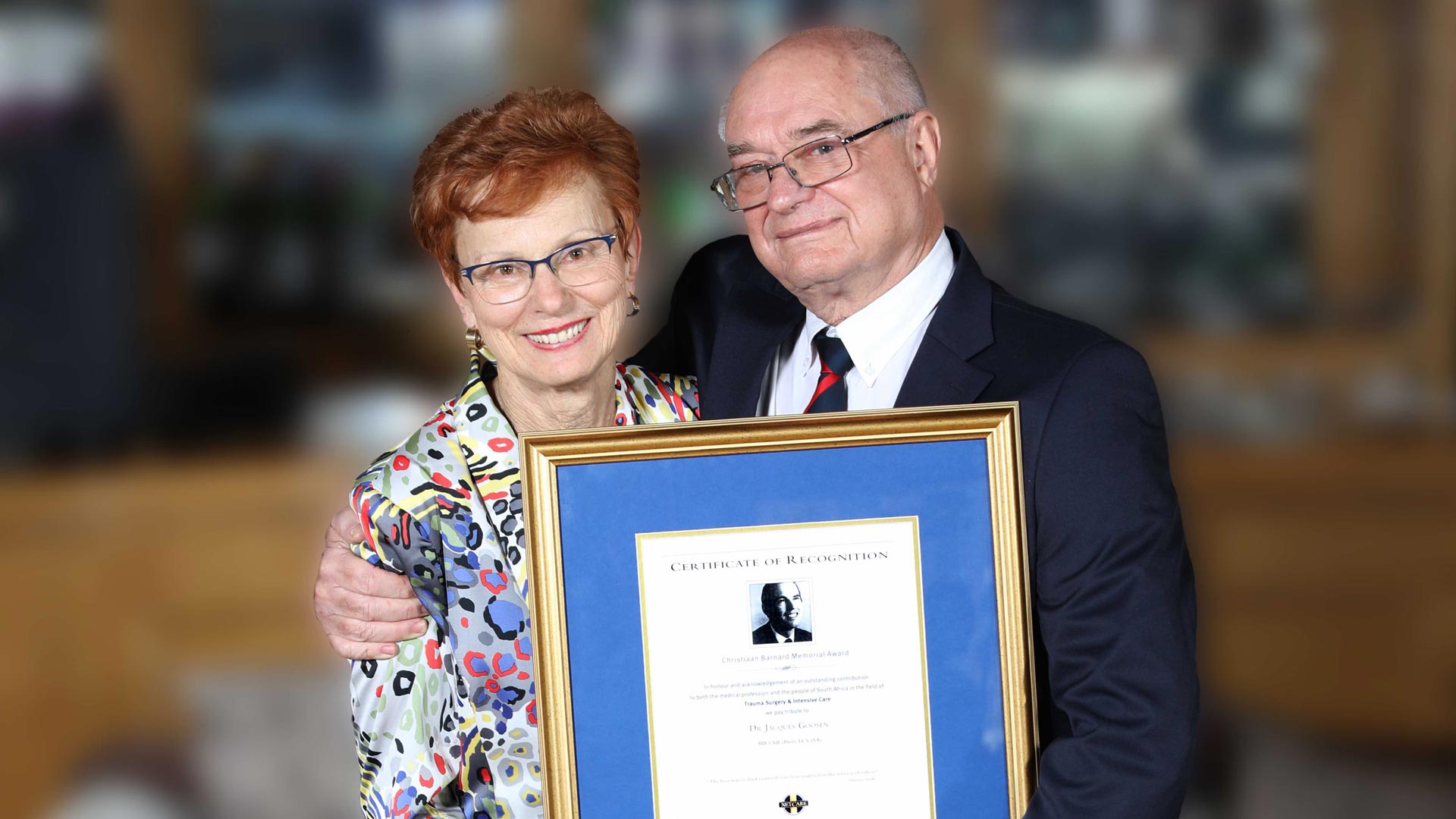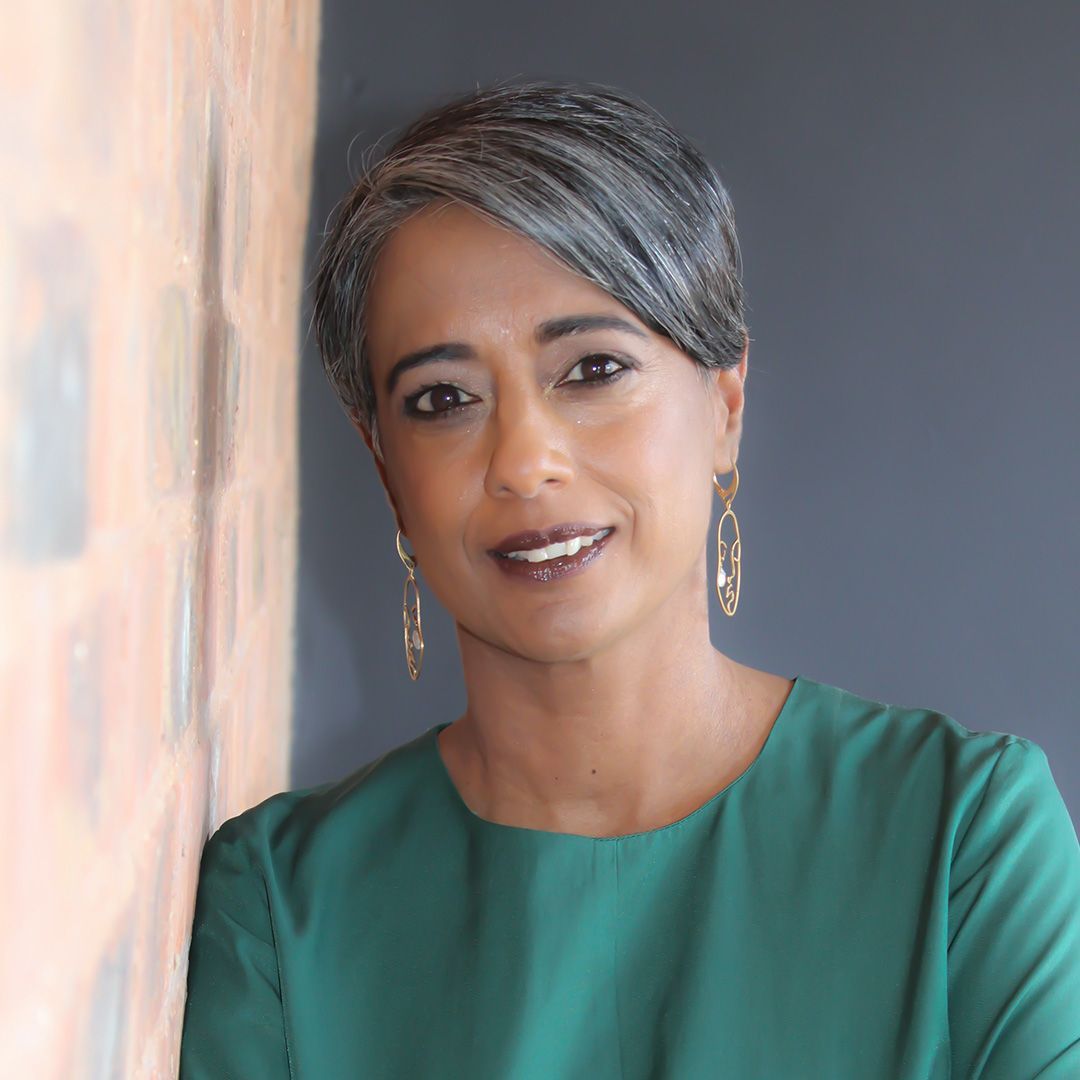Christiaan Barnard Memorial Award honours top trauma surgeon
May 10, 2021
Prof Jacques Goosen and his wife Marieta
Countless lives saved by surgeon’s hands and shared expertise
An extraordinary contribution to the advancement of trauma medicine and a career’s worth of lives saved were recently acknowledged with the awarding of Netcare’s highest honour to renowned Gauteng trauma surgeon, Professor Jacques Goosen.
“Over many years, Prof Goosen has placed his exceptional surgical skill and tremendous insight into trauma at the service of patients, saving countless lives from often catastrophic injuries,” says Dr Richard Friedland, chief executive officer of Netcare.
“It is our privilege to present Prof Goosen with the Christiaan Barnard Memorial Award, as a tribute to the outstanding contribution he has made throughout his illustrious career, spanning some four decades in both the private and public sectors.“
Founded in 2011, the Christiaan Barnard Memorial Award pays tribute to doctors who practice at healthcare facilities within the Netcare Group and who have demonstrated leadership in their specific field while contributing to the advancement of the medical profession.
“I am truly honoured to accept this Christiaan Barnard Memorial Award from the people of Netcare, an organisation which lives by respect, dignity and compassion, an ethos of true caring that is intrinsic to the Group under the leadership of Dr Richard Friedland,” Prof Goosen said in accepting the award at a ceremony held recently at the University of the Witwatersrand (Wits) in Johannesburg.
“While I accept this award on behalf of others, I dedicate it to the patients and their families who say, ‘Thank you, doctor,’ not only in the moment of recovery, but also in the moment of ultimate grief.”
Prof Goosen attained his MBChB through the University of Pretoria in 1971, and in 1978 specialised in general surgery as a Fellow of the College of Surgeons of South Africa. After eight years in private practice in Welkom, he was appointed head of the surgical department at the Ernest Oppenheimer Hospital.
He served as a senior specialist in the Wits trauma unit of the Johannesburg General Hospital, now Charlotte Maxeke Johannesburg Academic Hospital (CMJAH), where he continued his academic work and helped train other surgeons, many of whom came from around the world to learn from him, in specialised trauma techniques. In 1998, Prof Goosen started his long association with Netcare at the trauma unit of Netcare Milpark Hospital as a specialist surgeon on a part-time basis.
From 2003 until 2012, Prof Goosen was the principal surgeon and head of the trauma unit at CMJAH. Since 2007 he has been an Adjunct Professor with Wits University, building South Africa’s capacity in trauma medicine.
In 2006 he was appointed director of the trauma unit at Netcare Union Hospital where he also practised as a specialist trauma surgeon. He was instrumental in developing systems that saw the hospital accredited as a level one trauma centre by the Trauma Society of South Africa – one of only four private facilities in the country to have achieved this. From 2008 to 2020, he also served as director of Netcare Mulbarton Hospital’s trauma unit.
“Achievement is never individual, but at all times the result of contributions by others. I accept this award on behalf of my friends at Netcare, in particular at Netcare Milpark, Netcare Union and Netcare Rehabilitation hospitals and Netcare 911,” Prof Goosen said.
He expressed appreciation to the general manager of Netcare Union Hospital, Esme Abrahams, and a special thanks to Mande Toubkin, Netcare’s general manager of emergency, trauma, transplant and corporate social investment, whom he described as “the heart of trauma, emergency, disaster, and transplant healthcare in South Africa”.
“Above all, thank you to Marieta, my wife and partner, who keeps my feet on the ground,” Prof Goosen said. He also paid tribute to his colleagues in trauma medicine and other disciplines who work so closely together, united in their purpose of saving lives.
Professor Goosen remains a staunch supporter of Advanced Trauma Life Support (ATLS), South Africa, since 1992 when he started instructing, and served as Chairperson from 1998 to 2002. He was also a key member of the Strategic Review Committee for the World Health Organization’s Department of Violence and Injury Prevention. For four years until 2007, he served as Chairperson of the Trauma Society of South Africa.
“One’s career passes rapidly from achievement, to service, to reflection. Over many years, one experiences deep satisfaction from seeing young people uncover their hidden talents, realising how good they really are, and surpassing the achievements of their mentors,” said Prof Goosen, who has invested decades in training other medical professionals.
“There is no need to fear for the future. It is in the hands of a critical mass of people who see the spirituality of our world, who choose to treat their fellow man as they wish for themselves; and accept their own fallibility.”
Group medical director of Netcare, Dr Anchen Laubscher, presented Prof Goosen with the Christiaan Barnard Memorial Award, and warmly congratulated him on his numerous achievements, thanking him for his immense contribution to medicine.
“The dedication Prof Goosen has demonstrated in pursuit of preserving human life has earned him international respect and the lifetime gratitude of many thousands of patients and their families. He has been incredibly generous in sharing his expertise and building quality trauma care. He is indeed a most worthy recipient of the most prestigious award with which we can present him, the Christiaan Barnard Memorial Award.”

February 28, 2025
The lives of millions of South Africans with a litany of rare diseases can be vastly improved, and even saved, by addressing challenges in identifying, studying and treating their conditions. With Rare Disease Day on the 28th of February 2025, the Rare Diseases Access Initiative (RDAI) is driving an evolution of the country’s healthcare, through innovative strategies to better care for over 4.2million people living with an estimated 7000 rare diseases. “As our healthcare system faces significant changes in the years ahead, it is vital that we also advocate for people living with rare diseases in South Africa, especially those with limited healthcare access,” said Kelly du Plessis, CEO of Rare Diseases South Africa (RDSA), a member of RDAI. “As part of our ongoing research and awareness efforts, RDAI has conducted an initial analysis of the incidence and prevalence of rare diseases within the country.” This research will assist in improving access to healthcare, policy development, and patient advocacy, while giving critical insight into the challenges faced by patients. “According to research, some rare diseases affect fewer than 1 in a million people, while others, such as Down syndrome, cystic fibrosis, and haemophilia, have a more recognisable prevalence,” says Dr. Helen Malherbe, RDAI lead researcher on rare disease prevalence data. “Many conditions are undetected, underdiagnosed or misdiagnosed, with too many having no information available about them at all.” The RDAI was formed in 2019 to promote a more favourable environment for those impacted by rare diseases in South Africa. Participants include Ampath, the Board of Healthcare Funders (BHF), Discovery Health, Genetic Counsellors South Africa (SASHG), the Government Employees Medical Scheme (GEMS), Health Funders Association (HFA), Medihelp, Medscheme, North-West University (NWU), Rare Diseases South Africa (RDSA), the South African Medical Association (SAMA) and The South African Medical Technology Industry Association (SAMED). The Council for Medical Schemes (CMS) participates as an observer. In the same year, Rare Disease International signed a memorandum of understanding with the World Health Organisation leading to an international rare disease policy framework. In 2021, the United Nations General Assembly moved to adopt a resolution recognising 300 million people living with rare diseases worldwide. “A general lack of awareness and delayed diagnosis remain major hurdles for those affected by rare diseases. Policymakers and healthcare stakeholders need to prioritise access to treatment, diagnosis, and support for rare disease patients,” says Bada Pharasi, CEO of IPASA, “Through this initiative, working collaboratively with stakeholders at every level of the healthcare supply chain, we can bring real and meaningful change to those affected, including family members and care givers, through smart and efficient strategies.” The globally agreed definition of a rare disease is any medical condition with a specific pattern of clinical signs, symptoms, and findings that affects fewer than or equal to 1 in 2000 persons in a population. “Most are genetic, and some are inherited and passed down in families,” Malherbe says. “Some affect only the patient’s genetic recipe, while others may be acquired during life due to infection, trauma, or environmental effects. For many, the cause is still unknown. “These conditions mainly affect children, as they are largely incurable and many are life-threatening. Some require specialised and co-ordinated care, some have limited and expensive treatment options, while others have no information or effective treatments at all,” she adds. The RDAI is calling for a patient-centred care model built on equitable access, transparency and efficiency. Naturally, this model calls for the open participation of patients, the healthcare industry, health professionals, and the Government. “The most critical elements are robust diagnosis standards, improved access to treatment, data collection and management, co-ordination of care, measurement of outcomes and ongoing collaborative research,” du Plessis says. “We need to establish rare disease advisory committees, map gaps and opportunities, establish system requirements, create a roadmap and plan a phased implementation with clear timelines.” The RDAI states that these policy development steps would be a start in quantifying the disease burden and defining standards of care. This would be followed by building and strengthening the capacity to facilitate appropriate diagnosis, treatment, continuity and data monitoring. Thoneshan Naidoo, Chief Executive Officer of the Health Funders Association noted that, “We appreciate the unique opportunity provided by RDAI which enables stakeholders across the industry to work together and identify strategies that improve equitable access to the appropriate diagnosis, treatment and healthcare services for rare disease patients, in an affordable and sustainable manner, taking account of the other pressing needs across the healthcare system.” “True innovation in healthcare is only possible through partnerships and joint advocacy efforts that raise awareness and improve access to treatment. Our long-term goal is the development of a rare diseases policy framework and guidelines for coordinated care,” says Pharasi. “Our members are united in the commitment to unlocking improved patient outcomes and improving access to services and robust health needs assessment facilities.” he concludes. About RDAI The Rare Diseases Access Initiative (RDAI) is dedicated to advocating for improved healthcare access, policy development, and patient support for those affected by rare diseases in South Africa. The initiative brings together key healthcare stakeholders, including pharmaceutical associations, funders, genetic specialists, and patient advocacy groups, to drive impactful change. About RDSA Founded in 2013, Rare Diseases South Africa (RDSA) is a non-profit organisation advocating to ensure that people living with rare diseases and congenital disorders experience greater recognition, support, improved health service and better overall quality of life. Started out of personal need following the diagnosis of organisation founder, Kelly du Plessis' son, it became evident that there was a lack of awareness and support for rare diseases in general in South Africa. About IPASA The Innovative Pharmaceutical Association South Africa (IPASA) is a voluntary trade association representing 24 leading pharmaceutical companies committed to research, development, and innovation. Our mission is to drive healthcare advancement by advocating for policies that improve patient access to safe, high-quality, and affordable medicines.












